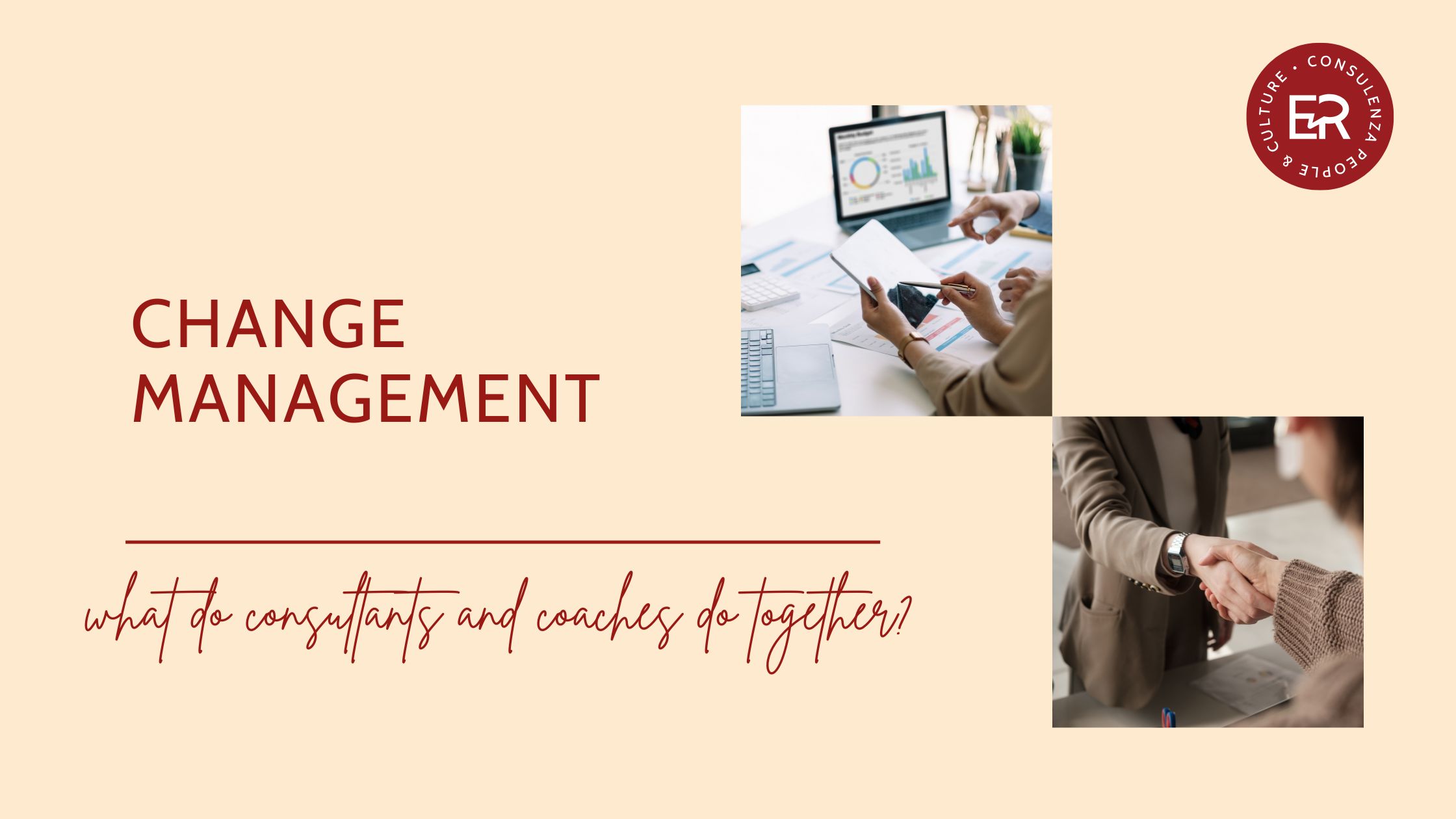
10 April 2025 Change Management: what do consultants and coaches do together?
In change management projects, counsellors and coaches, with their respective skills, can work in synergy for the optimal success of the project.
Consultant and Coach: Complementary Professionals in Change Management
In business change projects, especially those involving digital transformation or reorganisation of operational processes, it is often taken for granted that people will automatically adapt to new systems or workflows.
The statistics speak for themselves: cultural resistance and inadequate internal communication are among the main causes of failure in corporate change projects. These are not technical aspects but aspects that concern people.
The solution? A synergetic approach.
I discuss this below.

Change Management: The Role of the Consultant
A consultant is an expert who provides analyses, strategies and solutions based on his in-depth knowledge of a specific sector. His main role is to:
Operating Analysis and Diagnosis
Assess the current situation, identify problems and opportunities.
Developing Strategies
Propose concrete solutions and action plans to achieve objectives.
Follow up Implementation and Monitoring
Support the company in the implementation of strategies and monitor results.
The consultant focuses on the technical and strategic aspect of the change, providing external, data-driven guidance.

The Role of the Coach in Change Management
The coach, on the other hand, focuses on the individual and professional development of individuals and teams. His main role is to:
Facilitating Awareness
Helping people understand their strengths and potential to be agents of change and not just doers.
Developing Skills
Support the acquisition of new skills for personal growth; help people recognise themselves in a possible different role, during and after the change.
Motivate and Support
Provide a supportive and motivating environment to overcome obstacles and achieve goals.
The coach works on the human aspect of change, helping people to overcome resistance and develop potential.
10 common challenges to be faced in Change Management projects
Change projects in companies, while necessary for company growth and evolution, are often accompanied by challenges and difficulties. These challenges are essentially of three types:
1) Resistances
2) Shortcomings
3) Operational difficulties
Listed below are the 10 common challenges in the 3 types.
Resistances
- Employee resistance:
- Fear of the unknown, loss of control or concern for job security can generate strong resistance.
- Clear and transparent communication is essential to address these fears.
- Established corporate culture:
- Ingrained habits and routines may hinder the adoption of new processes or technologies.
- A step-by-step approach and active involvement of employees is needed to change the culture.
Deficiencies
- Lack of effective leadership:
- Weak or indecisive leadership can undermine the entire change initiative.
- Leaders must be visionary, communicative, and able to inspire confidence.
- Inadequate communication:
- Lack of clear and timely information can create confusion and disorientation.
- It is essential to establish effective communication channels and ensure a constant flow of information.
- Deficient planning and project management:
- Inadequate planning or inefficient project management can lead to delays, excessive costs, and unsatisfactory results.
- It is essential to define clear objectives, set intermediate milestones and constantly monitor progress.
- Lack of resources:
- Lack of financial, technological or human resources can have a negative impact on the project and additional intervention plans to mitigate risks must be identified.
Difficulties in operation
- Difficulties in integrating new technologies:
- The introduction of new technologies may require a period of adaptation and training, creating temporary operational interruptions.
- It is important to provide adequate support to employees during this phase.
- Inadequacy of skills:
- The lack of appropriate skills within the company, both at technical and managerial level, can hinder the implementation of change.
- Investment in training and development programmes is needed to fill these gaps.
- Misalignment of objectives:
- If the various departments or teams are not aligned on the objectives of change, conflicts and inefficiencies may arise.
- It is essential to ensure that all employees understand and share the vision of change.
- Insufficient data on the impact of change:
- The difficulty in measuring the impact of change can make it difficult to assess the effectiveness of initiatives and to make any corrections.
- It is crucial to establish clear metrics and monitor results over time.
Conclusion: the importance of synergy between consultant and coach in change management
The combination of the skills of the consultant and the coach can create an important synergy in change projects. The consultant provides strategic direction and technical solutions, while the coach supports people in adapting to change and improving skills and competences.
There are two reasons in particular why it is important to implement a synergy between consultant and coach in change management projects:
- together, they can address both the technical and human aspects of change, ensuring a holistic and integrated approach;
- synergy is particularly effective in organisational transformation projects, where both the definition of new strategies and the development of new people skills are crucial.
The human impact of change is too often underestimated.
To ensure the success of change projects, it is good to adopt a synergetic approach, in which the execution of change project steps is accompanied by the active involvement of people so that they feel like protagonists and not just executors.
And you, what challenge are you facing in your business change project?
Would you like to learn more? Contact me to explore the best solutions together.
Request a consultancyVisit also the section People & Culture Consultancy
